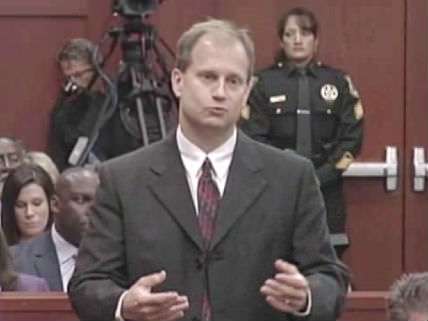Why Does It Matter When and Why George Zimmerman Followed Trayvon Martin?

A major theme of the case against George Zimmerman so far is that he unjustifiably and recklessly followed Trayvon Martin after seeing the teenager walking through his neighborhood and deeming him "suspicious." When Sean Noffke, the police dispatcher who took Zimmerman's call that night, testified on Monday, prosecutor Richard Mantei suggested that Zimmerman was bent on following Martin, while defense attorney Mark O'Mara suggested that Zimmerman got out of his car in response to Noffke's queries. The dispatcher twice asked Zimmerman to "let me know if this guy does anything," which O'Mara suggested Zimmerman may reasonably have interpreted as a request to keep his eye on Martin. Zimmerman's report that Martin was running prompted this exchange:
Noffke: He's running? Which way is he running?
Zimmerman: Down towards the other entrance to the neighborhood.
Noffke: Which entrance is that that he's heading towards?
Zimmerman: The back entrance…fucking [unintelligible].
Noffke: Are you following him?
Zimmerman: Yeah
Noffke: OK, we don't need you to do that.
Zimmerman: OK.
The sound of door chimes and wind can be heard in the middle of this exchange, right before Noffke asks, "Are you following him?" While Mantei suggested that Zimmerman planned to get out of his car all along, O'Mara suggested that Zimmerman was simply trying to provide the information that Noffke requested. Noffke conceded that his question about where Martin was running could have prompted Zimmerman to get out of the car for a better look, although he said that was not his intent. O'Mara focused on when Noffke heard Zimmerman's heavy breathing and when he did not in an effort to show that Zimmerman stopped following Martin after Noffke said "we don't need you to do that." The prosecution, by contrast, says Zimmerman disregarded Noffke's quasi-instruction. Similarly, during yesterday's testimony about Zimmerman's interest in starting a neighborhood watch following a series of burglaries, Mantei emphasized that volunteers like Zimmerman were expected to keep a safe distance from suspicious characters, while O'Mara emphasized that avoiding a confrontation does not necessarily mean letting someone slip out of sight. If the neighborhood watch is supposed to be the police department's "eyes and ears," he said, doesn't that imply keeping an eye on possible criminals?
Both sides clearly think the issue of when and why Zimmerman followed Martin is important. The prosecution portrays Zimmerman as tracking down Martin and killing him out of anger at the "fucking punks" who "always get away," while the defense is keen to rebut the idea that Zimmerman sought a confrontation. But there is another angle here that neither the prosecution nor the defense is likely to raise: The longer Zimmerman followed Martin (and regardless of his actual motivation), the greater the chance that Martin would have perceived him as a threat, especially if he saw Zimmerman's gun. The defense does not want to concede that Zimmerman could have seemed threatening, and the prosecution does not want to concede that Martin attacked Zimmerman, even in an attempt to neutralize a perceived threat. Yet that scenario is more plausible than the idea that Zimmerman, described by several witnesses as calm and mild-mannered, was suddenly transformed into a rage-fueled Death Wish–style vigilante.
Notably, identifying the aggressor in this situation is not necessarily dispositive. Under Florida's self-defense law, an aggressor always has a duty to retreat but may use force if the person he attacks responds with force "so great that [he] reasonably believes that [he] is in imminent danger of death or great bodily harm and that [he] has exhausted every reasonable means to escape such danger." So even if Martin threw the first punch out of anger at being followed (as opposed to fear), once the fight began he may have been justified in using force to prevent Zimmerman from shooting him. Conversely, even if Zimmerman started the confrontation, he may have been justified in shooting Martin if the fight unfolded as he describes—with Martin on top of him, reaching for the gun.


Show Comments (287)